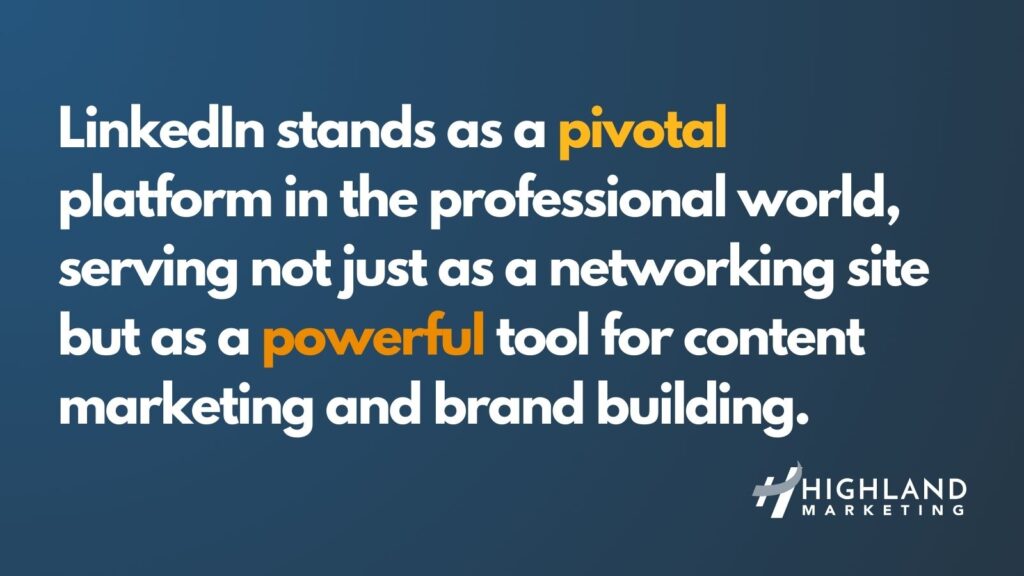LinkedIn stands as a pivotal platform in the professional world, serving not just as a networking site but as a powerful tool for content marketing and brand building.
Your online presence is synonymous with professional success, mastering LinkedIn content becomes crucial. Delve into the essence of crafting compelling LinkedIn content, while maintaining a strategic approach to maximise engagement and reach.
Crafting Ideal LinkedIn Content
Visual and textual elements
The power of visuals in capturing attention on LinkedIn cannot be understated. A well-chosen image or an engaging infographic can be the difference between a post that’s scrolled past and one that stops the viewer in their tracks. Coupled with captivating text, these elements form the backbone of successful LinkedIn content. It’s not just about what you say, but how you visually present it.
Incorporating teasers in your posts can significantly enhance their appeal. A teaser is a brief, intriguing preview of your content that entices the reader to click and read more. This technique is particularly effective in today’s fast-paced digital environment, where grabbing attention quickly is key.
Clarity and focus in communication
The hallmark of effective LinkedIn content is clarity and focus. Your message should be concise yet powerful, delivering value in a straightforward manner. This approach ensures that your audience immediately gravitates to the core message, enhancing engagement. Clear, focused communication is not only more digestible but also more shareable, extending your reach on the platform.
Each piece of content should ideally focus on a single message or idea. This singular focus allows for a stronger impact and clearer call-to-action, driving higher engagement and conversions. Content that is direct and to-the-point resonates better with professional audiences who value their time.
Sourcing Engaging Topics
Identifying relevant content sources
Sourcing content that resonates with your audience is critical. This involves understanding your industry, your audience’s needs, and the latest trends. One effective method is conducting a competitor analysis, which can provide insights into what works well in your industry. Additionally, listening to client feedback can reveal what your audience is interested in or concerned about.
Utilising AI tools can also offer an edge in content creation. These tools can help identify trending topics, suggest content ideas, and even analyse the performance of your posts. By blending human creativity with AI insights, you can craft content that is both innovative and relevant.
Leveraging industry trends and client feedback
Staying abreast of industry trends is essential for creating relevant and timely LinkedIn content. This involves not only following industry news but also engaging with online forums and discussions. By understanding the current conversations and developments within your industry, you can position your content to be at the forefront of these discussions.
Client feedback is an invaluable source of content ideas. It provides direct insights into what your audience finds valuable, interesting, or necessary. This feedback can come from various channels, including surveys, comments, or direct messages. By tuning into your audience’s voice, you can tailor your content to meet their specific needs and interests.
Measuring content performance
Setting and tracking content goals
Before diving into content creation, it’s crucial to set clear goals for what you want to achieve. These goals could range from increasing brand awareness to generating leads or driving website traffic. Once your goals are set, tracking the performance of your content becomes vital. This involves monitoring metrics like engagement rates, click-through rates, and conversions.
Tracking these metrics allows you to gauge the effectiveness of your content and adjust your strategy accordingly. Whether it’s tweaking the type of content, the posting time, or the call-to-action, data-driven adjustments can significantly enhance the performance of your LinkedIn strategy.
Analysing engagement and reach
Understanding the nuances of post engagement and reach is key to refining your LinkedIn strategy. This involves not just looking at the number of likes or shares but also analysing who is engaging with your content and how. The timing of your posts, the format you choose, and the topics you cover all play a role in how far your content reaches and how deeply it resonates with your audience.
Analysing the engagement patterns can also help you identify the best times to post and the most effective content formats. Whether it’s long-form articles, short updates, or multimedia posts, each format has its strengths and can be leveraged for different objectives.
Enhancing reach and engagement
A robust LinkedIn strategy requires not just creating content, but ensuring it reaches and resonates with the right audience. This section delves into effective ways to amplify your content’s visibility and deepen engagement with your audience.
Proven strategies for boosting visibility
Consistent content delivery on LinkedIn is essential for maintaining visibility and audience engagement. However, it’s not just the frequency of posts that matters; it’s the value they bring to your audience. To achieve this, a careful balance between regular updates and high-quality, engaging content is crucial. Every post should aim to either educate, inform, or entertain your audience, thus adding value to their LinkedIn experience.
Quality content on LinkedIn often means providing well-researched, thoughtfully presented information that speaks directly to your audience’s needs and interests. Whether it’s through detailed industry analyses, eye-catching infographics, or interactive content that sparks conversation, the goal is to create posts that are not just seen but actively engaged with. These posts are more likely to be shared within and beyond your immediate network, thereby extending your reach and solidifying your presence in your industry.
Engagement triggers and conversation starters
To elevate interaction with your LinkedIn content, incorporating specific engagement triggers is an effective strategy. These triggers, such as creating a sense of urgency (FOMO), providing value through knowledge, or evoking emotional responses, can motivate users to engage with your content. For instance, a post that hints at an upcoming, not-to-be-missed opportunity can spark curiosity and prompt immediate engagement.
Conversation starters are another critical aspect of fostering engagement. Engaging your audience with thought-provoking questions or initiating discussions on relevant topics can transform passive viewers into active participants. This approach not only boosts the engagement metrics of your posts but also provides valuable insights into your audience’s thoughts and preferences, enabling you to tailor future content more effectively.
Establishing strong content pillars
Creating a diverse and robust content strategy on LinkedIn involves establishing several core themes or ‘content pillars.’ These pillars form the foundation of your content strategy, ensuring your posts are not only consistent and relevant but also diverse and interesting to your audience.
Diverse content types for engagement
Integrating a variety of content types within your strategy caters to different audience preferences and keeps your feed dynamic. For instance, sharing industry insights can position you as a thought leader, while case studies and success stories can showcase your expertise and credibility. Incorporating interactive elements like polls or quizzes can also make your content more engaging and memorable.
Personal stories and testimonials add a human element to your brand. Sharing experiences, whether they’re customer success stories or behind-the-scenes glimpses into your company, can create a more personal and relatable brand image. This approach not only enhances engagement but also builds trust and loyalty among your audience.

Effective writing models for LinkedIn
The way you structure your LinkedIn posts can significantly impact their effectiveness. Different writing models can be applied based on the goal of your content, whether it’s to inform, persuade, or entertain.
Structuring posts for maximum impact
The inverted pyramid model, commonly used in journalism, is effective for delivering information-heavy content. This model presents the most important information at the beginning, gradually narrowing down to the less critical details. For narrative-driven content, storytelling can be a powerful tool, creating an emotional connection with the audience and making your brand more relatable.
The AIDA model (attention, interest, desire, action) is particularly useful for promotional content or calls to action. It guides the reader through a journey from capturing their attention to encouraging them to take a specific action. Each of these models has its unique strengths and can be leveraged to enhance the impact of your LinkedIn content.
Persuasive techniques in content creation
Incorporating persuasive techniques into your writing can make your content more compelling and convincing. The 4 P’s model (promise, picture, proof, push) is an effective framework for crafting persuasive content. It involves making a promise to solve a problem, painting a picture of life with the problem solved, providing proof that you can solve it, and then pushing the reader towards taking action. The before-after-bridge approach is another persuasive technique, ideal for showcasing the transformation your product or service can bring about.
Optimising LinkedIn company pages
Your LinkedIn company page is the cornerstone of your brand’s presence on the platform. It’s not just a digital business card, but a dynamic space to showcase your brand, engage with your audience, and grow your professional network. In this section, we will explore key strategies to optimise your company page for maximum impact and engagement.
Essential elements of company page optimisation
A well-optimised company page begins with a compelling headline and an engaging summary. Your headline should be attention-grabbing and reflective of your brand’s core value proposition. The summary, on the other hand, needs to tell your brand’s story in a concise yet captivating way, highlighting what sets you apart and what value you offer to your audience.
Visual elements play a crucial role in attracting and retaining visitor attention. A professional profile picture and a banner image that aligns with your brand identity can make a strong first impression. Ensure these visuals are of high quality and reflect the professionalism and ethos of your brand. They should serve as a visual extension of your brand story, reinforcing the messages conveyed in your textual content.
Visual aspects and custom URLs
The visual appeal of your LinkedIn page is essential in creating a lasting impression. Consistent use of brand colours, logos, and imagery helps in building brand recognition. The banner image, in particular, offers a significant opportunity to convey your brand’s message, showcase your products or services, or highlight your company culture.
Customising your LinkedIn URL not only enhances the professional look of your page but also makes it easier for people to find and remember your company on LinkedIn. A custom URL is more shareable and memorable, which can be particularly beneficial for marketing and branding efforts.
Maximising engagement for business growth
LinkedIn stands as a vital platform for professional networking and content marketing. By mastering LinkedIn content creation, optimising your company page, and leveraging the platform’s unique features, you can significantly enhance your brand’s online presence and engagement.
Implementing the strategies discussed in this article can lead to a noticeable improvement in your LinkedIn performance. However, for businesses looking to truly maximise their ROI and leverage the full potential of LinkedIn, partnering with experts can be a game-changer. Highland Marketing offers comprehensive building brands services that can help elevate your LinkedIn strategy, ensuring that your content not only reaches a wider audience but also resonates deeply with them.
For tailored solutions that align with your business goals and drive tangible results, contact Highland Marketing. With their expertise, you can transform your LinkedIn presence, turning it into a powerful tool for business growth and brand building. Take the first step towards mastering LinkedIn content and maximising your ROI – reach out to Highland Marketing today.


